


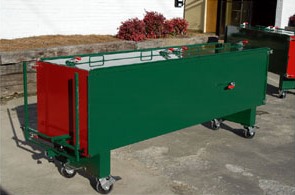

This system is suitable for
capturing handgun and shotgun rounds. In the images you can see the X-Y axis bore
centering device to ensure proper bore alignment. On request, it's possible to
have different and personalized weapons holders. The range is the following:
|
Products |
Item |
Description |
Dimensions |
Weight |
|
DPRS |
DP-01 |
Low Volume Handgun unit for calibres
up to
357
Mag |
0.5 x 0.5 x 1.8 (m) |
46
kg |
|
DPRS |
DP-03 |
Standard
Handgun and Shotgun unit
for calibres up to:
Handgun:
Casull 454
Shotgun:
12 gauge
(Rimfire rifles up to 22 magnum may also be used in this recovery
system.)
|
0.6 x 0.6 x 2.4 (m) |
318
kg |
Some
additional detail:
-
Repack
Lifecycle
Handgun 1,250 - 1,500
rounds (depending on caliber).
Shotgun approximately 500 rounds (12 gauge slugs).
Also
keep in mind that itisn't necessary to
replace all cartridges due to the fact that the recovery system
being 8 feet long, and typically, most handguns stop in 1 - 1.2 meters.
Some
of the examples captured (click on images for larger view)
|
Comparison photo
|
Technical data
|
|
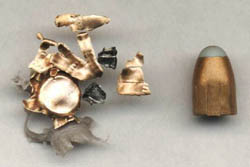
|
Bullet: 357 Magnum
Glaser
Muzzle Energy: 575 FT/LBS
Velocity: 1800 FPS
Stop Distance: 7 FT
Notes: Notice the condition of the round fired into our system,
as compared to the one fired into a water tank. The recovery method
developed by Ballistics Research, is the ONLY system available that
will capture high-velocity frangible ammunition, intact.
After entering the recovery system, this very frangible ammunition was
decelerated at the rate of 257.14 FPS, per linear foot of travel,
proving without a doubt that this system is capable of capturing any
type of ammunition in undamaged condition.
|
|
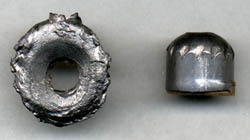
|
Bullet: Winchester
12 Gauge 1 oz Rifled Slug
Fired: Lot #B1TC14 from Mossberg 500A
Muzzle Energy: 2,700 FT/LBS
Velocity: 1,600 FPS
Stop Distance: 7 FT
Notes: The 12 Guage slug is one of the most difficult to
capture and identify/match rounds. With the DPRS, recovery is easy and
provides an undamaged round complete with clearly-marked strations.
|
|
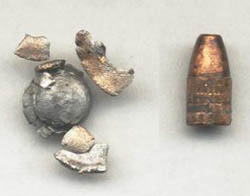
|
Bullet: .22
Caliber HP 36 Gr.
Fired: Remington Nylon 66
Muzzle Energy: 165
FT/LBS
Velocity: 1,420 FPS
Stop Distance: 4 FT
Notes: The .22 caliber, one of the most
frequently used calibers in criminal activities, is also extremely
difficult to capture using a conventional water tank.
|
|
Abbreviation Key
FT: Feet | FT/LBS: Foot Pounds | FPS: Feet Per
Second
Gr. Grain | HP: Hollow-point
|
All hand-loads that were used
were loaded to the maximum allowable powder charge. This was done to demonstrate
that it is no longer necessary to bother with the hassle, danger and time
consuming nature of using downloading for forensic testing.
All of the recovered samples
shown on this web site were fired at point-blank range - 4 feet, or less. This
was done to demonstrate the capability of this system to capture various types
of rounds, at their maximum velocity and energy levels.
Other
examples without the need of a comparison (click on images for larger view)
|
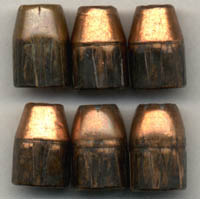 |
Bullet:
230 Gr. 45 ACP
Fired: Twice!
Muzzle Energy: 370 FT/LBS
Velocity: 850 FPS
Stop Distance: 5 FT
Notes: This photo shows 3 different types of 45 rounds: Gold Dot,
Starfire, and Rainier. All of these rounds have one thing in common, THEY
WERE ALL FIRED TWICE! This was done in order to demonstrate the
capabilities of the recovery system developed by Ballistics Research.
|
|
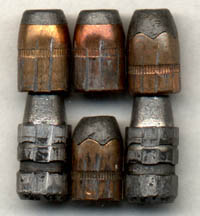 |
Bullet:
158 Gr. SWC and 125 Gr. SJHP
Fired: Smith & Wesson 64
Muzzle Energy: 200 FT/LBS (SWC) 248 FT/LBS (SJHP)
Velocity: 755 FPS (SWC) 945 FPS (SJHP)
Stop Distance: 2 FT (SWC & SJHP)
Notes: Multiple .38 caliber rounds are shown,
all have been flawlessly recovered from the DPRS.
|
|
 |
Bullet: Winchester 9mm
+P+ 115 Gr. JHP
Fired: Smith & Wesson 5906
Muzzle Energy: 399 FT/LBS
Velocity: 1,260 FPS
Stop Distance: 4 FT
Notes: These particular rounds were tested
because of their very high velocity. As has been proven through testing,
had these rounds been fired into a water tank the only thing left to work
with would be scraps from the bullets.
|
|
 |
Bullet:
.22 caliber 36 Gr. HP
Fired: Remington Nylon 66
Muzzle Energy: 165 FT/LBS
Velocity: 1,410
Stop Distance: 4
Notes: These examples exhibit no damage,
deformation, or distortion of any kind. They are literally in the
condition they were in when they left the barrel of the weapon.
|
|
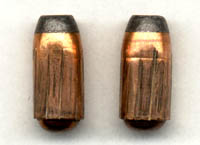 |
Bullet: 357 Magnum 180
Gr. JHP #R357M10
Muzzle Energy: 524 FT/LBS
Velocity: 1,145 FPS
Stop Distance: 5 FT
Notes: These rounds were decelerated at a
rate of 229 FPS/FT with no deformation with the DPRS.
|
|
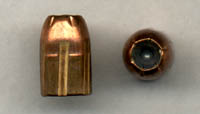 |
Bullet: 125 Gr. .357
SIG
Fired: SIG Sauer P226
Muzzle Energy: 489 FT/LBS
Velocity: 1,350 FPS
Stop Distance: 6.5 FT
Notes: n/c
|
|
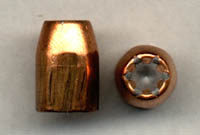 |
Bullet: 165 Gr. 40
caliber GD
Fired: Glock 22
Muzzle Energy: 484 FT/LBS
Velocity: 1,150 FPS
Stop Distance: 5 FT
Notes: In this view notice that not only are
the striations and powder/barrel residue still completely intact, but as
can be seen in the top view, these projectiles show no damage or
deformation of any kind. They are in absolutely perfect condition.
|
|
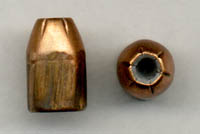 |
Bullet: Hornady 180 Gr.
40 caliber JHP/XTP #9136 LOT #010002
Fired: Glock 22
Muzzle Energy: 361 FT/LBS
Velocity: 950 FPS
Stop Distance: 4.5 FT
Notes: These rounds were fired and recovered
by David Lloyd, Evidence Technician with the Cave Spring, Georgia Police
Department.
|
|
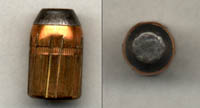 |
Bullet:
Winchester .44 Remington Magnum 240 Gr. JSP
Fired: Ruger Super Blackhawk
Muzzle Energy: 741 FT/LBS
Velocity: 1,180 FPS
Stop Distance: 6.8 FT
Notes: Close examination of the photos above
will show that this round is not damaged or distorted. To capture a round
this powerful in such a short distance and with absolutely no damage is a
true testament to the capabilities of the DPRS.
|
|
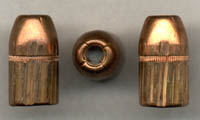 |
Bullet:
300 Gr. Hornady XTP 454 Casull
Fired: Ruger Super Red Hawk
Muzzle Energy: 1,813 FT/LBS
Velocity: 1,650 FPS
Stop Distance: 7 FT
Notes: In this example, kinetic energy was
dissipated at the rate of 259 FT/LBS per linear foot of travel. The
condition of these rounds clearly shows the value of the DPRS.
|
|
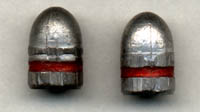 |
Bullet: .45 ACP 230 Gr.
LCRN
Muzzle Energy: 370 FT/LBS
Velocity: 874 FPS
Stop Distance: 5 FT
Notes: The ultimate test of sensitivity,
cast lead! As can be seen, not only is the center mold seam intact, but
the very fragile wax gas seal is undamaged, as well. If the DPRS had any
abrasive qualities at all, the center mold seam and wax gas seal would
have been damaged, if not destroyed completely.
|
|
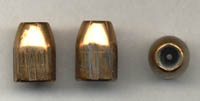 |
Bullet: 45 caliber 230
Gr. Federal Hydra Shok
Fired: AMT (Government Model)
Muzzle Energy: 370 FT/LBS
Velocity: 850 FPS
Stop Distance: 5 FT
Notes: Not only are these rounds in "as-fired"
condition, but the powder/barrel residue is still intact also.
|
|
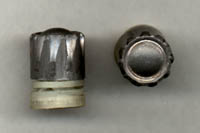 |
Bullet: 12 Gauge 1 oz
Slug
Muzzle Energy: 2,260 FT/LBS
Velocity: 1,525 FPS
Stop Distance: 7 FT
Notes: At the moment of capture, this slug
contained 2,260 FT/LBS of kinetic energy. Notice that not only is the
striation left by the front sight post plainly visible and identifiable,
but as can also be seen, there's absolutely no damage or deformation at
all.
|
All samples shown above are
real full factory loadings and can be demonstrated upon request.
The samples shown on this web
site are just a small demonstration of the capability of this recovery method.
However, it is also capable of capturing ammunition that is well outside the
scope of what appears above.



![]()


